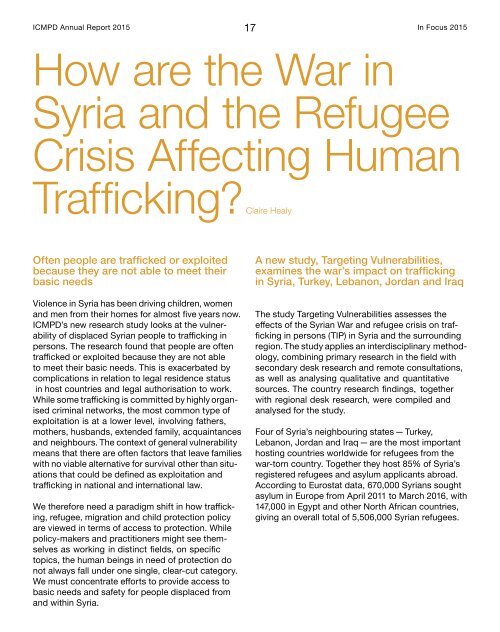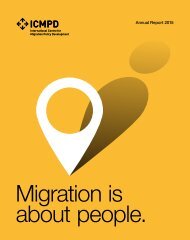ICMPD-Review-2015
Create successful ePaper yourself
Turn your PDF publications into a flip-book with our unique Google optimized e-Paper software.
<strong>ICMPD</strong> Annual Report <strong>2015</strong><br />
17<br />
In Focus <strong>2015</strong><br />
How are the War in<br />
Syria and the Refugee<br />
Crisis Affecting Human<br />
Trafficking? Claire Healy<br />
Often people are trafficked or exploited<br />
because they are not able to meet their<br />
basic needs<br />
Violence in Syria has been driving children, women<br />
and men from their homes for almost five years now.<br />
<strong>ICMPD</strong>’s new research study looks at the vulnerability<br />
of displaced Syrian people to trafficking in<br />
persons. The research found that people are often<br />
trafficked or exploited because they are not able<br />
to meet their basic needs. This is exacerbated by<br />
com plications in relation to legal residence status<br />
in host countries and legal authorisation to work.<br />
While some trafficking is committed by highly organised<br />
criminal networks, the most common type of<br />
exploitation is at a lower level, involving fathers,<br />
mothers, husbands, extended family, acquaintances<br />
and neighbours. The context of general vulnerability<br />
means that there are often factors that leave families<br />
with no viable alternative for survival other than sit u-<br />
ations that could be defined as exploitation and<br />
trafficking in national and international law.<br />
We therefore need a paradigm shift in how trafficking,<br />
refugee, migration and child protection policy<br />
are viewed in terms of access to protection. While<br />
policy-makers and practitioners might see themselves<br />
as working in distinct fields, on specific<br />
topics, the human beings in need of protection do<br />
not always fall under one single, clear-cut category.<br />
We must concentrate efforts to provide access to<br />
basic needs and safety for people displaced from<br />
and within Syria.<br />
A new study, Targeting Vulnerabilities,<br />
examines the war’s impact on trafficking<br />
in Syria, Turkey, Lebanon, Jordan and Iraq<br />
The study Targeting Vulnerabilities assesses the<br />
effects of the Syrian War and refugee crisis on trafficking<br />
in persons (TIP) in Syria and the surrounding<br />
region. The study applies an interdisciplinary methodology,<br />
combining primary research in the field with<br />
secondary desk research and remote consultations,<br />
as well as analysing qualitative and quantitative<br />
sources. The country research findings, together<br />
with regional desk research, were compiled and<br />
analysed for the study.<br />
Four of Syria’s neighbouring states — Turkey,<br />
Lebanon, Jordan and Iraq — are the most important<br />
hosting countries worldwide for refugees from the<br />
war-torn country. Together they host 85% of Syria’s<br />
registered refugees and asylum applicants abroad.<br />
According to Eurostat data, 670,000 Syrians sought<br />
asylum in Europe from April 2011 to March 2016, with<br />
147,000 in Egypt and other North African countries,<br />
giving an overall total of 5,506,000 Syrian refugees.
















